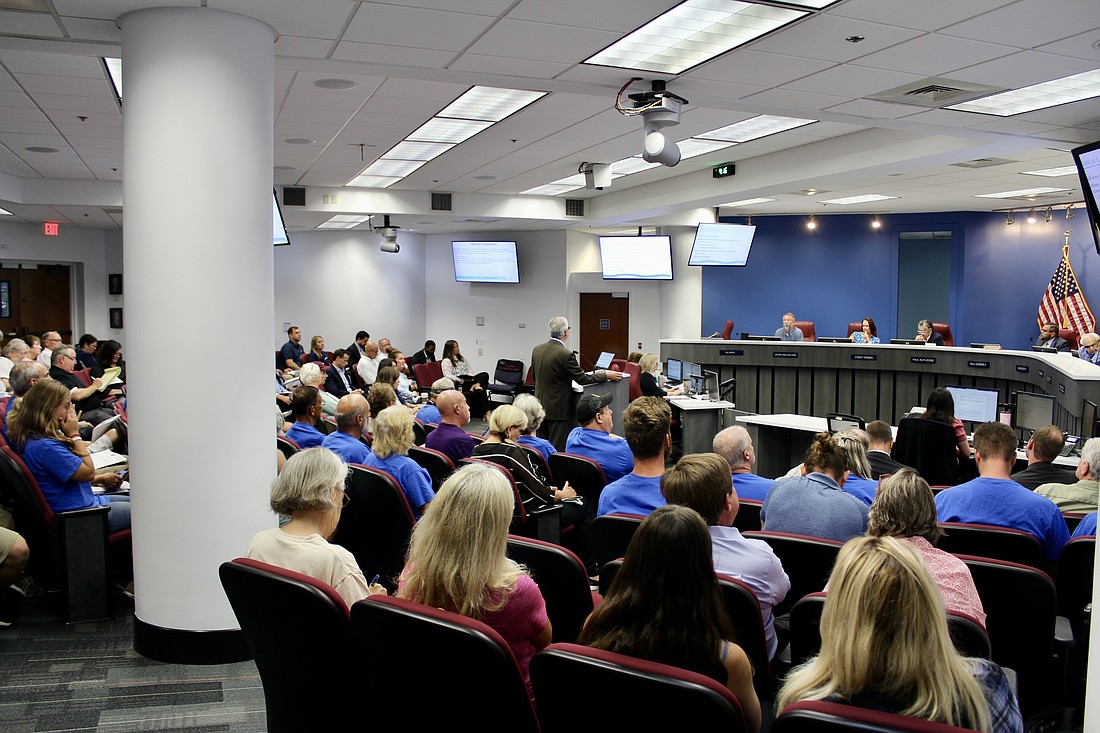- July 2, 2025
-
-
Loading

Loading

The residents who packed the Manatee County Administration Building's Patricia M. Glass Chambers on Aug. 10 said they wanted to deliver a clear message to county commissioners.
On Aug. 17, the commissioners will consider changes to the comprehensive plan that would lessen protections for wetlands.
Manatee County staff members said they could save staffing time if commissioners would remove language that causes duplicative processes through both the state and county.
As Planning Commission Chairman Bill Conerly put it, it will also save time for anyone building anything.
However, the changes being considered would cut language out of the comprehensive plan where the county provides additional protection over state guidelines for wetlands when it comes to development.
Most of the standing room-only crowd Aug. 10 were pleading with the county not to make any changes to the comprehensive plan. One citizen said changes to the comprehensive plan wouldn't even benefit builders in the long run.
"If our waterways are tainted, no one's going to come (to Manatee County)," Elwood Park resident John Taylor said during the public comment period. "They're not going to come and buy the houses they want to build. They're not going to rent houses or visit vacation homes if we have smelly waterways with dead fish."
Some of those in attendance were worried that the proposed changes have come about because builders are pressing to have more land available for construction.
Bradenton resident Nancy West has lived in Manatee County for 50 years and is a member of the Serenoa Chapter of the Florida Native Plants Association.
“I’ve seen all the (proposed) changes,” West said. “And I’ve seen that the developers seem to have more power than the average citizen.”
Those who came to speak against the proposed changes received a level of satisfaction when planning commissioners voted 4-2 to recommend that Manatee County commissioners not make any changes that would lessen wetland protections.
The four planning commissioners who opposed a language change in the comprehensive plan said they either couldn’t see how the changes benefited the public or didn’t have enough information to recommend any changes at this point.
Proposed changes to the comprehensive plan would effectively hand regulatory power to the state in regards to building near wetlands.
Manatee County commissioners are not bound to follow the Planning Commission's recommendation so the proposed changes still could be passed Aug. 17.
During the Aug. 10 meeting, Planning Commissioner Paul Rutledge made a motion to defer the vote on whether or not to recommend the changes until more scientific information on wetland impacts could be reviewed. When the motion became overly complicated, he made a new motion to vote down the recommendation instead.
Cindy Kebba seconded the motion, and it passed in a 4-2 vote with John DeLesline and David Roth providing the other two votes in favor. Conerly and, newly appointed member, Richard Bedford, voted against the motion. Planning Commissioner Bill Smock was absent.
Kebba noted a large amount of public comments received by the Planning Commission prior to the meeting. She read them all, but said one simplified the matter for her when it came to voting — "Finish this sentence: This changes in the public interest because ..."
“I can’t answer that,” Kebba said. “The staff report says the question we’re supposed to answer is "Is this in the public benefit? I don’t think it is.”
No one from Manatee County's staff spoke during the presentation, which was handled by county’s consultant Daniel Delisi. His assessment pointed to land acquisition and restoration projects as more effective means to improve water quality than the current language that extends buffers beyond state requirements, saying more is not "blanketly" better.
Former Commissioner Joe McClash, who served the county at-large for 22 years, took his opportunity to weigh in during public comments. McClash brought a PowerPoint presentation and about 400 pages of scientific research to enter into the record to dispute Dilisi’s assessment and questioned the origins of the proposed changes.

“The request (to make changes to the comprehensive plan) was made by the Building Industry Association. Not a bad thing, people have the right to come before the county and ask for changes all the time,” McClash said. “The way it’s done, though, it should be transparent. So you have something that really wasn’t county initiated because it was duplication. It was because, supposedly, the development interests have an interest in changing the rules.”
Changes being considered would include lowering mitigation efforts, too. While the BIA requested the county reconsider a few policies and codes, Information Outreach Manager Bill Logan said there was no lack of transparency.
“This is common practice where engineers, planners or attorneys ask staff to think about updates due to changes in circumstances over the years,” Logan replied by email. “Land development regulations and Comprehensive Plans are not meant to be written and then left intact or irrefutable for 20-30 years.”
Manatee County Commissioner Kevin Van Ostenbridge stood in the back of the room for part of the discussion. He said the other commissioners were likely watching online, but until a presentation was given to the board, he wouldn’t comment.
If language changes are approved by the Manatee County Commission, those changes would go before the board one last time on Oct. 5 to either be adopted or rejected.